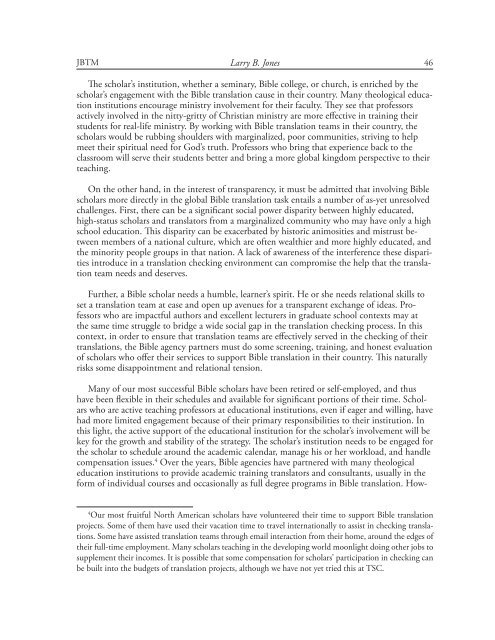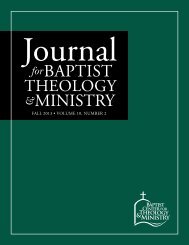Bible Translation as Missions
pTf2MG
pTf2MG
You also want an ePaper? Increase the reach of your titles
YUMPU automatically turns print PDFs into web optimized ePapers that Google loves.
JBTM Larry B. Jones46The scholar’s institution, whether a seminary, <strong>Bible</strong> college, or church, is enriched by thescholar’s engagement with the <strong>Bible</strong> translation cause in their country. Many theological educationinstitutions encourage ministry involvement for their faculty. They see that professorsactively involved in the nitty-gritty of Christian ministry are more effective in training theirstudents for real-life ministry. By working with <strong>Bible</strong> translation teams in their country, thescholars would be rubbing shoulders with marginalized, poor communities, striving to helpmeet their spiritual need for God’s truth. Professors who bring that experience back to thecl<strong>as</strong>sroom will serve their students better and bring a more global kingdom perspective to theirteaching.On the other hand, in the interest of transparency, it must be admitted that involving <strong>Bible</strong>scholars more directly in the global <strong>Bible</strong> translation t<strong>as</strong>k entails a number of <strong>as</strong>-yet unresolvedchallenges. First, there can be a significant social power disparity between highly educated,high-status scholars and translators from a marginalized community who may have only a highschool education. This disparity can be exacerbated by historic animosities and mistrust betweenmembers of a national culture, which are often wealthier and more highly educated, andthe minority people groups in that nation. A lack of awareness of the interference these disparitiesintroduce in a translation checking environment can compromise the help that the translationteam needs and deserves.Further, a <strong>Bible</strong> scholar needs a humble, learner’s spirit. He or she needs relational skills toset a translation team at e<strong>as</strong>e and open up avenues for a transparent exchange of ide<strong>as</strong>. Professorswho are impactful authors and excellent lecturers in graduate school contexts may atthe same time struggle to bridge a wide social gap in the translation checking process. In thiscontext, in order to ensure that translation teams are effectively served in the checking of theirtranslations, the <strong>Bible</strong> agency partners must do some screening, training, and honest evaluationof scholars who offer their services to support <strong>Bible</strong> translation in their country. This naturallyrisks some disappointment and relational tension.Many of our most successful <strong>Bible</strong> scholars have been retired or self-employed, and thushave been flexible in their schedules and available for significant portions of their time. Scholarswho are active teaching professors at educational institutions, even if eager and willing, havehad more limited engagement because of their primary responsibilities to their institution. Inthis light, the active support of the educational institution for the scholar’s involvement will bekey for the growth and stability of the strategy. The scholar’s institution needs to be engaged forthe scholar to schedule around the academic calendar, manage his or her workload, and handlecompensation issues. 4 Over the years, <strong>Bible</strong> agencies have partnered with many theologicaleducation institutions to provide academic training translators and consultants, usually in theform of individual courses and occ<strong>as</strong>ionally <strong>as</strong> full degree programs in <strong>Bible</strong> translation. How-4Our most fruitful North American scholars have volunteered their time to support <strong>Bible</strong> translationprojects. Some of them have used their vacation time to travel internationally to <strong>as</strong>sist in checking translations.Some have <strong>as</strong>sisted translation teams through email interaction from their home, around the edges oftheir full-time employment. Many scholars teaching in the developing world moonlight doing other jobs tosupplement their incomes. It is possible that some compensation for scholars’ participation in checking canbe built into the budgets of translation projects, although we have not yet tried this at TSC.



